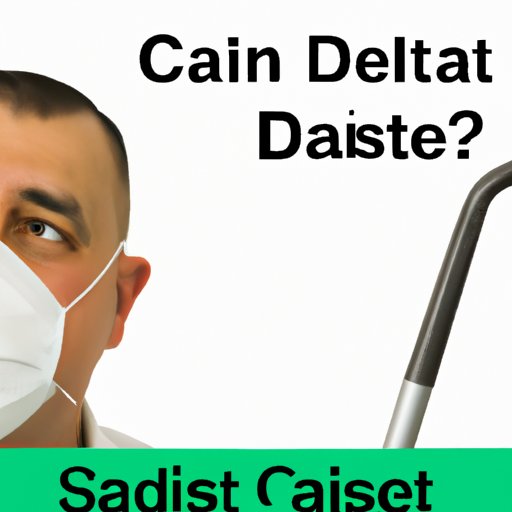
I. Introduction
Most people know that smoking is bad for their health, but did you know that dentists can often tell if you smoke just by looking at your teeth and gums? This is because smoking can have a significant impact on your oral health, from increased risk of gum disease to tooth discoloration and bad breath. In this article, we will explore the link between smoking and oral health and explain how dentists are trained to identify smokers. We’ll also offer tips for quitting smoking or reducing tobacco use and explain why it’s essential to be honest with your dentist about your smoking habits.
II. The Science Behind Dentists’ Ability to Identify Smokers
Dentists can tell if someone smokes in several ways. First, they may notice a distinct odor of tobacco on a patient’s breath or clothing. Smoking can also cause yellow or brown stains on teeth or dentures, which can be a telltale sign of tobacco use. Dentists may also detect signs of gum disease or oral cancer, which are more common among smokers than non-smokers.
A study published in the Journal of the American Dental Association found that dentists were able to correctly identify smokers 94% of the time based on visual cues alone. When visual and olfactory (smell) cues were combined, dentists correctly identified smokers 100% of the time.
III. Smoking and Your Oral Health: What Your Dentist Knows
Smoking can have a significant impact on oral health. For example, smokers are more likely to develop gum disease, which can cause bleeding, inflammation, and tooth loss. Smoking can also stain teeth and dentures, cause bad breath, and increase the risk of oral cancer.
According to the Centers for Disease Control and Prevention, smokers are six times more likely to develop oral cancer than non-smokers. Oral cancer can be deadly if not caught early, which is why it’s so important to have regular dental checkups to screen for this and other conditions.
IV. How Your Teeth Reveal Your Smoking Habits to Your Dentist
When assessing a patient’s smoking status, dentists look for a variety of telltale signs. These may include:
- Yellow or brown stains on teeth or dentures
- An increased buildup of plaque and tartar
- Gum recession
- Persistent bad breath
- Changes in the appearance or texture of oral tissues
Images of these signs can be helpful for patients who may not be aware of the damage that smoking can cause to their oral health. For example, smoking can cause gum recession or tooth loss, which can be visible on X-rays or other imaging tests.
V. The Connection Between Smoking and Dental Exams
Smoking can impact the results of routine dental exams in several ways. For example, X-rays may be less accurate if a patient has significant tooth staining or plaque buildup. Smoking can also make it harder for dentists to detect early signs of gum disease or oral cancer.
This is why it’s essential for patients to be upfront with their dentist about their smoking habits. By knowing that a patient smokes, a dentist can take steps to ensure that all necessary tests are performed, and any potential problems are caught early.
VI. What to Expect During a Dental Checkup if You Use Tobacco
If you smoke, your dentist may recommend additional tests or procedures during your checkup. These may include:
- A more thorough examination of oral tissues to check for signs of cancer
- A deep cleaning to remove plaque and tartar buildup
- More frequent checkups, such as every three to four months instead of every six months
It’s essential to be aware that these additional tests or procedures may come with additional costs. However, the long-term benefits of good oral health are worth the investment.
VII. The Importance of Telling Your Dentist if You Smoke
It’s vital to be honest with your dentist about your smoking habits, even if you’re embarrassed or worried about being judged. By knowing that you smoke, your dentist can provide you with the care and advice you need to maintain good oral health. They can also suggest strategies for quitting smoking or reducing tobacco use, which can have positive effects on your overall health and well-being.
Remember, your dentist is there to help you, not to judge you. They have likely seen many patients who struggle with smoking or other addictive behaviors and can offer guidance and support to help you kick the habit for good.
VIII. Conclusion
Smoking can have a significant impact on oral health, from increased risk of gum disease to tooth discoloration and bad breath. Dentists are trained to identify smokers and can provide patients with the care and advice they need to maintain good oral health. If you smoke, it’s essential to be honest with your dentist about your habits and to work together to develop a plan to reduce or quit tobacco use. Good oral health is key to overall health and well-being, so make sure to prioritize regular dental checkups and follow your dentist’s recommendations for care.




